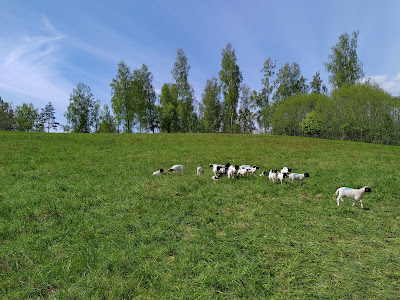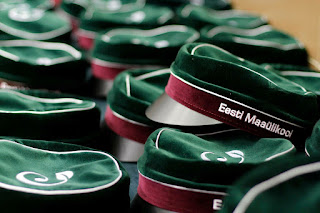The Second Year, Part 2: Science
Work goes on. Statistical analyses. Manuscripts. My supervisor Tarmo said that a scientific article is only finished when you want to throw up when you see it. I’m not quite there yet – months of feedback and discussions are still ahead.
Finally it is time for my sheep project again. This year, I’m much more prepared
than last, I know what to do. My friend Seidi, the veterinary technician, took
three weeks off her regular work to be here. Liilia and Ants, the owners of the
farm, help me where they can. In return, I help them with feeding the sheep,
heating the sauna, assisting the kids with their schoolwork, cooking, and by
taking over some night shifts. When a sheep starts giving birth, we have to
watch it and see that everything goes well, and if not, we have to give
birthing aid. Ants and Liilia patiently teach us how. Once the new mother has
cleaned the lambs, we bring them into a separate box, so they can get used to
each other’s sounds and smells and are easier to monitor, before we release
them into the herd. Every few hours, we have to refill the water buckets and
feed in these boxes and make sure that the lambs get enough milk form their
dam. If not, we have to intervene again: fixating the ewe so the lamb can drink
in peace, or milk the ewe and feed the lamb with a bottle. Thawing up colostrum
(that first milk with all the good antibodies) from last year and tube-feeding
it to the lamb. Or even start an adoption-project. But if everything goes well
(as in most cases), I enroll the lambs into my study. They get eartagged, I
record their birth weight and take a colostrum sample from the dam. Every week,
I then draw a blood sample form the lambs and take a rectal swab, from which we
will later get information about the intestinal bacteria and how the flora
changes over time. In the evening, the kids read my data out loud, so I have an
easier time entering everything into Excel tables. If it’s not too late, the youngest
and I read children’s books to each other, because he needs to practice reading
out loud and I need to practice Estonian.
It’s a lot of work, and contrary to last year, my supervisor isn’t coming to help and pick up samples twice a week. Soon, the freezer is full, I’m running out of some materials, and lack of sleep and lunch are starting to show. The older daughters were helping last year, but now they’re in school elsewhere. Outside helpers weren’t hired, there is only Seidi. Eventually, she succumbs to a cold and I sit in my little lab having to decide whether I should deal with my samples or feed the sheep in the boxes first. Both should be happening right now. There is also a poor lamb in the corner that was too cold in the stable, I need to feed it, and warm up its hot water bottle again. But I haven’t eaten, I haven’t slept, I’m too exhausted. I need help, but not from students that the university can send me, who want to learn how to draw blood from sheep. It takes so much patience to teach them, more time than if I just did it myself, and in the end the lambs’ veins will be messed up and I won’t have enough blood to do all my analyses. After a sauna and a quick bath in the cold pond, I feel a bit better. „Please teach me“, I say to Ants. „How to draw the blood without assistance. I need to do it alone, without anyone holding the lamb for me. The kids need to feed the sheep in the meantime, it’s too much right now.“ I had tried to take a milk sample by myself this morning. But adult sheep are heavier and much stronger than me, and the popular method of holding the sheep between your legs doesn’t work with my short legs. In an uncomfortable angle, I tried to press the ewe against the wall of her box and milk her at the same time, resulting in a short flight into the metal fence at the other end of the box, a painful arm that I couldn’t use for the rest of the day, and victory for Mrs. Sheep. A few days later, I finally get help from Tartu. Seidi, the kids and their friends are feeding the sheep before helping me to find the lambs from the growing herd that need to be sampled today. “Should I hold it?” asks Elisabeth.
“Please label the test tubes, I got this” I reply and grab a
two-week old lamb with a big blue number on its back. I place it on the ground
and fixate it with my knees. My left hand holds the head and simultaneously
puts stasis on the jugular vein, and with my right hand, I unerringly poke into
the vessel. A few second later, I hand my colleague the blood-filled tube with
a proud smile. I’ve become an expert.
Just like last year, I have arrived here in winter boots and a warm jacket, but six weeks later, we are taking the samples on the pasture, our faces covered in sunscreen, wearing T-shirts, and hoping to get out of the rubber boots as soon as possible. We let the herd go and I switch on the centrifuge one last time. This year, we even manage to have a little party at the end of the lambing season and sampling period for this year. We have cake, alcohol-free drinks, sauna, and I play my small repertoire on the karmoška. Meanwhile, Ants is chasing a duck that escaped from the new enclosure through the pond.
Back in Tartu, good news are waiting: My first scientific
article has been published, a second one was accepted by the journal; I am an
actual, published scientist now. My colleague (and first author of the published
article) successfully defends her PhD theses and we celebrate her. Even Toomas,
who never joins us, can be convinced to have a drink with us in one of the
riverside bars.
The academic year is coming to end, but it doesn’t look like
I will have a real summer vacation. I take the sheep blood to the lab that has
AC to hide from the heatwave, but I have articles to write, statistical
analyses to do, deadlines to keep, and lectures to prepare.
A few days before the official end of the year, I am assigned a seat in a committee. I have to review and grade a Master’s thesis, and for two days, I listen to the defenses of the almost-veterinarians, ask curious and critical questions, and, in Estonian, discuss the grades all of these students should be awarded. I actually enjoy this work, and asking questions. The topics are diverse, from anesthesia during orthopedic surgeries in dogs, endocrinological diseases in small animals, to biosecurity in Finnish dairy farms and mosquitoes as potential vectors for African Swine Fever. “If possible, I would like to be in the committee again next year”, I say to Toomas. He is happy to hear that – apparently, volunteers are hard to find for this job.
That leaves my own evaluation. My second year of PhD is
over, is everything going according to plan and am I worth my scholarship?
“As you can see, two articles have been published, the third is ready to submit, and for the fourth I am currently doing the statistical analysis”, I report in Estonian, with only very little accent (or so they tell me). “For next year, I have planned to participate in two conferences, and I will supervise a student with her Master’s thesis.” This makes me especially proud. I offered a topic, and someone took it, someone chose me to supervise them! The professors in front of me seem more impressed by my language skills. But the main thing is that soon after, my student profile shows: “Evaluation 2021/22: positive.” So, without having to worry about that, I can return to my work in the lab and in the office, and continue my research over this summer limbo between the second and third year. Maybe, since I’m officially on vacation, I can even cut down my working hours…








Getting locked out of your home or car is stressful, but Schlüsseldienst Berlin provides fast and reliable assistance. Their 24/7 service ensures you can get back inside quickly, no matter the time or situation. A trustworthy locksmith is essential for security and convenience.
AntwortenLöschen